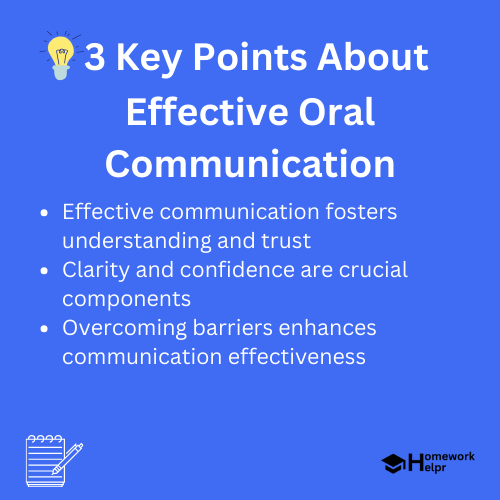📝 Summary
Effective oral communication is a critical skill essential for both personal and professional success, helping to express ideas clearly and engage an audience. Its importance lies in facilitating understanding, building relationships, and encouraging collaboration. Key components include clarity, confidence, body language, and listening skills. Challenges like noise, language differences, and emotional factors can hinder communication effectiveness. To enhance these skills, one should know their audience, practice active listening, use visual aids, and seek feedback. Ultimately, mastering effective oral communication can lead to improved relationships, career advancement, and successful interactions in various contexts.
Effective Oral Communication
Effective oral communication is a vital skill for success in both personal and professional environments. It is the ability to express ideas clearly and confidently while engaging an audience. Good oral communication can strengthen relationships, enhance understanding, and motivate others. Whether you’re giving a speech, participating in a discussion, or simply having a conversation, mastering this skill is essential.
Importance of Oral Communication
There are several reasons why effective oral communication holds significant importance.
- Facilitates Understanding: Clear communication helps to ensure that messages are conveyed accurately.
- Builds Relationships: Good communication fosters connections and trust between individuals.
- Encourages Collaboration: In team settings, effective communication is key to collaborative efforts and achieving common goals.
When individuals communicate effectively, it reduces the possibility of misunderstandings, which can lead to conflicts or errors. It increases the likelihood of successful outcomes in various interactions, whether in the classroom, workplace, or social settings.
Definition
Collaboration: Working jointly with others to achieve a common goal.
Components of Effective Oral Communication
There are several key components that contribute to effective oral communication:
- Clarity: The message should be clear and easily understood.
- Confidence: Speaking confidently helps to engage listeners and conveys authority.
- Body Language: Non-verbal cues, such as gestures and eye contact, play a crucial role in communication.
- Listening Skills: Effective communication is a two-way process; listening is just as important as speaking.
For instance, when giving a presentation, using simple language and visuals can enhance clarity. Additionally, maintaining eye contact and an open posture can create a welcoming environment for your audience.
Definition
Gestures: Movements of the hands or body that convey meaning in communication.
Barriers to Effective Oral Communication
Despite the importance of effective communication, several barriers can hinder the process:
- Noise: External distractions can lead to misunderstanding.
- Language Differences: Variations in language proficiency can create obstacles.
- Emotional Factors: Emotions such as anger or anxiety can cloud communication.
By identifying these barriers, individuals can strategize ways to overcome them. For example, if noise is an issue, choosing a quiet environment for discussions can make a significant difference.
Definition
Proficiency: The state of having a high level of skill or knowledge in a particular area.
Tips for Improving Oral Communication Skills
Improving oral communication skills requires practice and dedication. Here are some practical tips for enhancing your abilities:
- Know Your Audience: Tailor your message based on the audience‚’ interests and level of understanding.
- Practice Active Listening: Show you are engaged by nodding and using follow-up questions.
- Use Visual Aids: Incorporate tools like slides and diagrams to support your message.
- Seek Feedback: Request constructive criticism to help identify areas for improvement.
For example, when presenting to classmates, consider what they find intriguing or challenging. This can make your presentation more relevant and memorable.
💡Did You Know?
Did you know that effective communicators often employ storytelling techniques to make their messages more relatable and enjoyable?
Practical Applications of Oral Communication
Effective oral communication skills can be applied in numerous scenarios, including:
- Public Speaking: Delivering speeches at events or conferences.
- Classroom Discussions: Engaging in conversations with peers and teachers.
- Workplace Communication: Collaborating with colleagues and presenting ideas.
In each context, the ability to convey messages effectively can lead to improved relationships and career advancement. For instance, a strong presentation can leave a lasting impression on your audience, showcasing your knowledge and expertise.
Example
When you participate in a debate, effectively presenting your arguments and countering opposing views demonstrates oral communication skills.
Joining a club like Toastmasters International can also provide opportunities to practice public speaking and receive feedback from peers.
Conclusion
Effective oral communication is essential for success in many aspects of life. By understanding its importance, components, and barriers, individuals can work to improve their skills continuously. Practicing clarity, confidence, and active listening can enhance communication with others. No matter the context, the investment in becoming a better communicator will yield significant rewards in personal relationships, academic pursuits, and professional endeavors.

Related Questions on Effective Oral Communication
What is effective oral communication?
Answer: Effective oral communication is the ability to express ideas clearly and confidently while engaging an audience.
Why is oral communication important?
Answer: It facilitates understanding, builds relationships, and encourages collaboration among individuals.
What are key components of effective oral communication?
Answer: The key components include clarity, confidence, body language, and listening skills.
How can I improve my oral communication skills?
Answer: You can improve your skills by knowing your audience, practicing active listening, using visual aids, and seeking constructive feedback.
